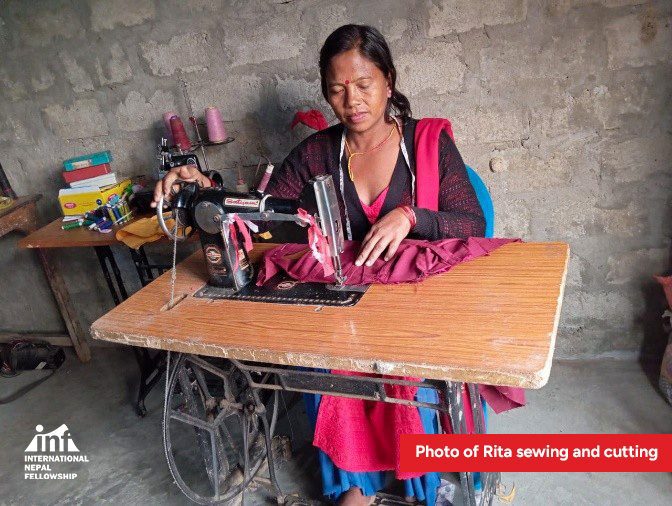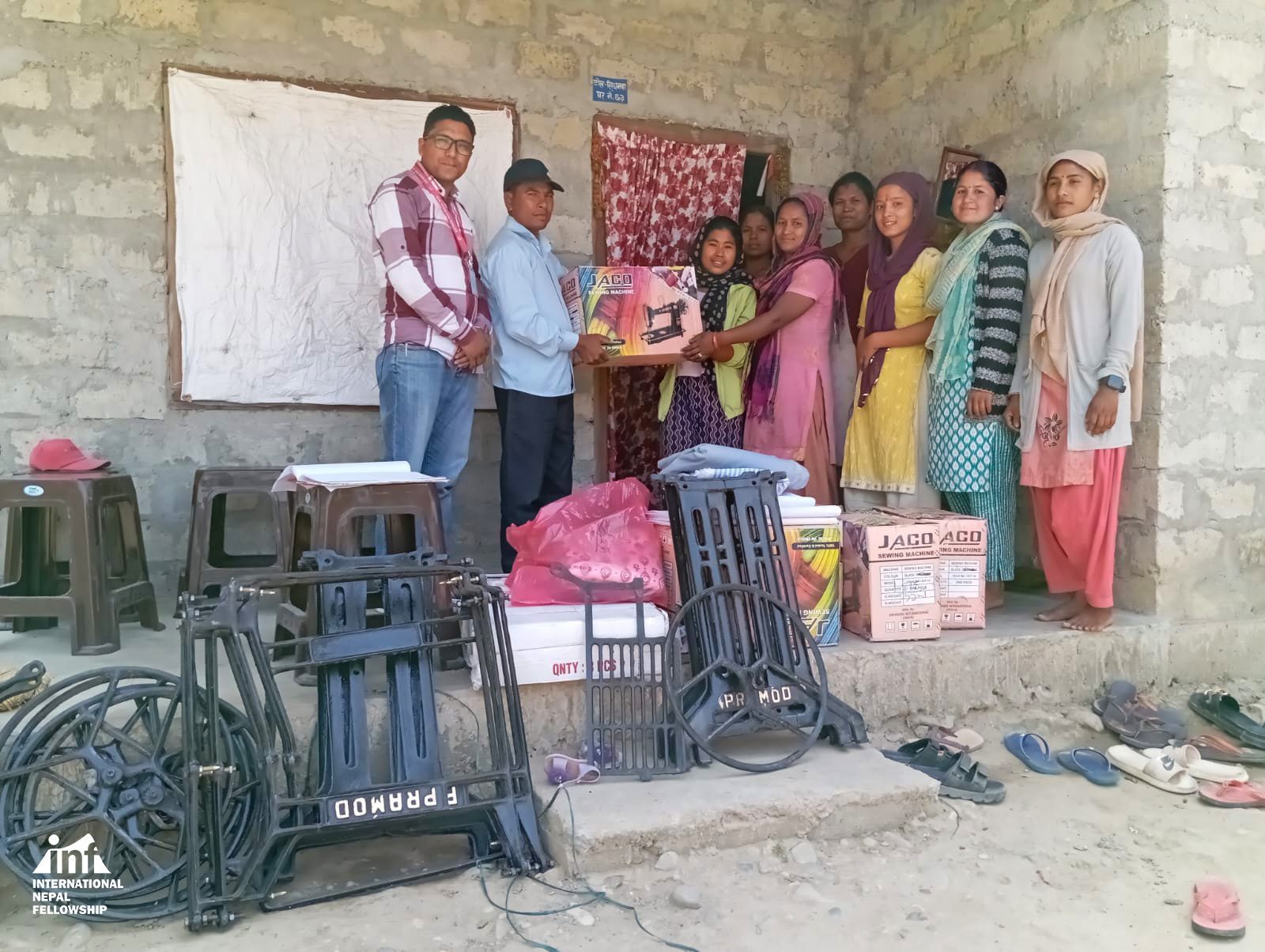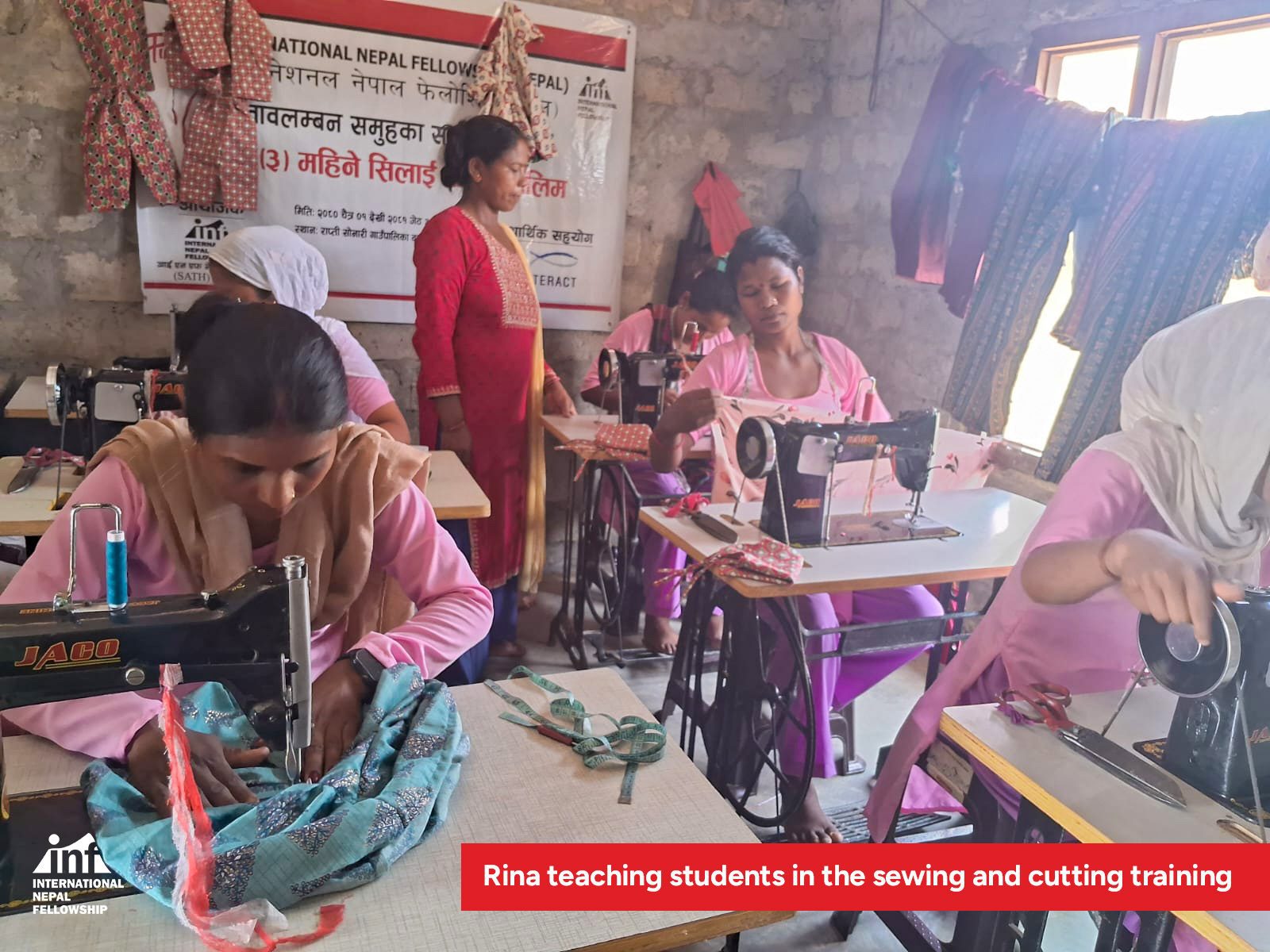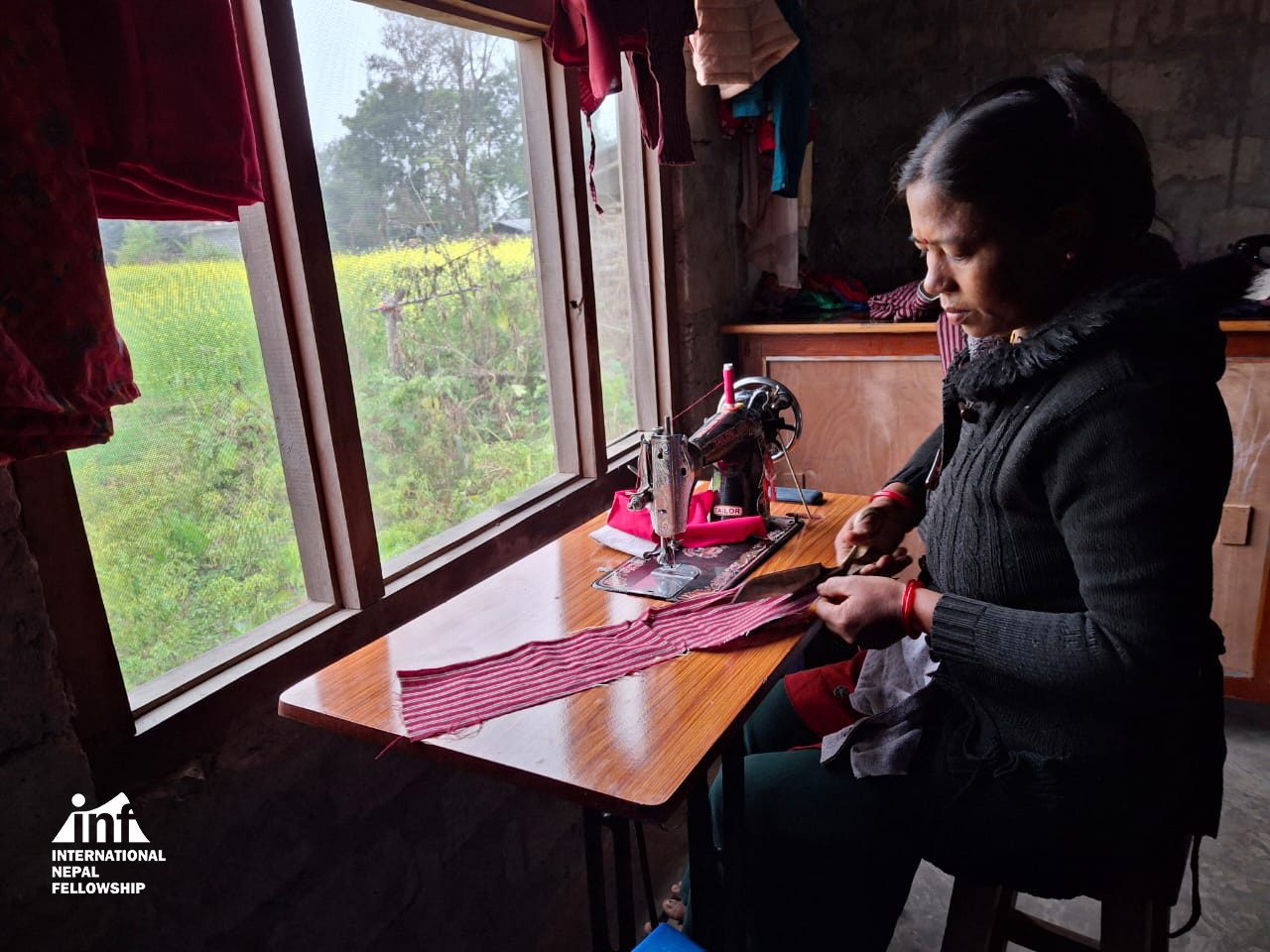Rina Kumari Tharu is a 36-year-old woman. She belongs to the Tharu ethnic community in Nepal. She lives in Ward No. 6 of Raptisonari Rural Municipality, Banke. She was the middle child among five sisters and one brother. Her family always faced financial problems. During her childhood, she was busy with household chores and taking care of her younger siblings. She wanted to go to school, but her poor parents could not afford it.
Several years later, Rina got married. Her family has six members: her husband, who has a disability; her father-in-law, who has asthma; her elderly mother-in-law; two daughters; and herself. Because of her husband’s disability and her father-in-law’s illness, Rina became the family’s breadwinner. Rina’s marriage was a love marriage with family approval. Her husband was healthy when they married but later got Japanese Encephalitis and became disabled. Because they loved each other, they did not give up on marriage. After marriage, Rina understood the difficulties but does not regret. She says, “True partnership and struggle teach many things in life.”
Before Rina married, her husband’s family survived on farming for six months. Her husband’s brother and father worked as laborers. Now, her father-in-law is sick and cannot work. After two years of marriage, her husband’s brother moved away, and the family’s situation became very hard. Rina took on the main responsibility for the household.
The family owned only 222.967 square meters of land, which was enough to feed them for five months. For the rest of the year, Rina worked as a laborer and sold firewood to support the family. Rina looks back on her life full of hardship. To provide for her family, she collected firewood from the forest to sell and worked many manual labor jobs like planting, harvesting rice, building houses, and other odd jobs.
When INF Nepal started the SATH project in her community to end human trafficking, gender-based violence, and child marriage a year ago, Rina joined the group working on these issues. She regularly attended meetings. The project helped poor women with vocational training and ways to earn income. Rina had always wanted to learn tailoring and was selected for three months of tailoring training. The project gave her all the materials she needed to start her business. After training, her confidence grew as she began sewing clothes. She could pay for household needs like food and medical costs with the money she earned from tailoring.
Rina’s income increased as she became better at tailoring. She not only made clothes for clients but also became an expert and was hired by local organizations to train other women. She now had several sources of income. Last year, she built a small house with the money she earned from sewing and training fees. She bought building materials like iron sheets, wood, sand, and cement and helped build the house herself. Rina remembers, “We used to live in a small thatched house that could not keep out the rain. Sometimes I would wake up at midnight to cover the roof with plastic to stop leaks. We had to live under that weak roof during the rainy season.”
But Rina’s life has changed. Through the project, she learned tailoring and found a way to be independent. “Even though I couldn’t study, INF taught me skills to support myself and gave me new hope,” she says with emotion.
Rina’s life has changed a lot thanks to her tailoring business. She now earns about NPR 13,000 per month and up to NPR 20,000 during festivals. Besides tailoring, she earns extra money by teaching tailoring skills. She charges NPR 1,000 per student and usually has two or three students each month. Her income covers household costs, medical treatment, her daughters’ education, and daily needs.
Besides earning money, Rina is active in community groups. She regularly saves part of her earnings with her group to secure her future. She says, “INF Nepal changed my life a lot. I was hopeless. They gave me skills to support myself and a new purpose. I am very thankful to INF Nepal.”
Rina was very happy and excited when selected for tailoring training. She said she never thought she would get such an opportunity. She felt this was the chance to make her life better and learn a skill to earn a living. When she earned her first money from sewing, her face lit up with a smile. The money was small, but she felt proud to earn cash by herself. She bought rice and other essentials for her home with that money, which was a proud moment for her.
Her daily life is busy. In the morning, she cooks food, sends her daughters to school, and does other house chores. During farming season, she works in the fields. When not farming, she sews clothes. She teaches tailoring during the day and cooks and spends time with her family in the evening. She starts sewing at 4 am and often sews at night if there is no time during the day. She also takes part in group meetings and social work.
At first, Rina did not believe in her abilities. People in the market did not trust a new woman tailor. Society did not support women working outside the home. She had few sewing materials, and INF Nepal gave her only a simple sewing machine. She could not buy more because of lack of money.
With help from the group and INF Nepal, she gained confidence. After her first satisfied customer, others started giving her work. Later, INF Nepal gave her a sewing machine stand, an interlock machine, a table for cutting cloth, and other tools. This helped her work faster, easier, and better quality. Local groups also asked her to train others, which made her even more confident.
Her husband says, “I never thought my wife could become so capable. I am proud of her.” Their daughters are inspired by their mother and dream of becoming independent.
Her community’s view of her has changed. Before, people saw her as a hard laborer who begged for work and traveled far for odd jobs. Now, she is known as a successful entrepreneur, a skilled tailor, and a trainer. Women and young girls look up to her as a role model.
Other women in her village were inspired by her success and took training in income skills. Some are now working in tailoring, animal farming, and vegetable growing.
Her husband and in-laws are proud of her work and support her.
In Rina’s group, four women benefited from the SATH project. Two learned tailoring, one learned bag making, and one learned handcrafts. In other groups, many women learned tailoring, goat and pig farming, vegetable farming, and other skills. Some started small businesses. Since the project started, cases of domestic violence and child marriage have dropped. Women have grown stronger and more aware of their rights.

The tailoring training aimed to help women develop skills to earn income at home and build confidence. This goal has been achieved.
Since the project began, awareness of gender violence, labor exploitation, child marriage, and human trafficking has increased. Women now raise their voices, understand legal processes, and work together more.
After training, INF Nepal continues to support women with materials, business training, regular follow-up, group meetings, saving advice, and sharing information.
Rina’s income of NPR 13,000 (about USD 100) covers food, school fees for her daughters, and medical costs for her father-in-law. She used her earnings to build a small house and plans to build a water tap and toilet soon.
Her income rises during festivals but stays stable otherwise. She faces risks like illness, price increases, and fewer customers.
Rina saves regularly with her group. She plans to open a small shop and prioritize her daughters’ education. She has saved about NPR 9,000 in the group and financial institutions for the future.
Rina’s journey shows how courage, support, and skills can change a person’s life. She faced many problems in the past, but with hard work and help from INF Nepal, she became strong and independent.
Now, Rina is not only a skilled tailor and trainer, but also a leader and example for other women in her village. Her story encourages others to believe in themselves and work for a better future.
Rina dreams of opening a small shop and giving her daughters the education she could not have. She continues to move ahead with hope and confidence.
Her story shows that when women get the right support and training, they can improve their lives and help others too. Rina has not just changed her life, but also brought hope to her family and community.
Checkout Lastest Story: Lissne Village Takes a Stand to #BeatPlasticPollution with Organic Farming and Waste Reuse
.gif)